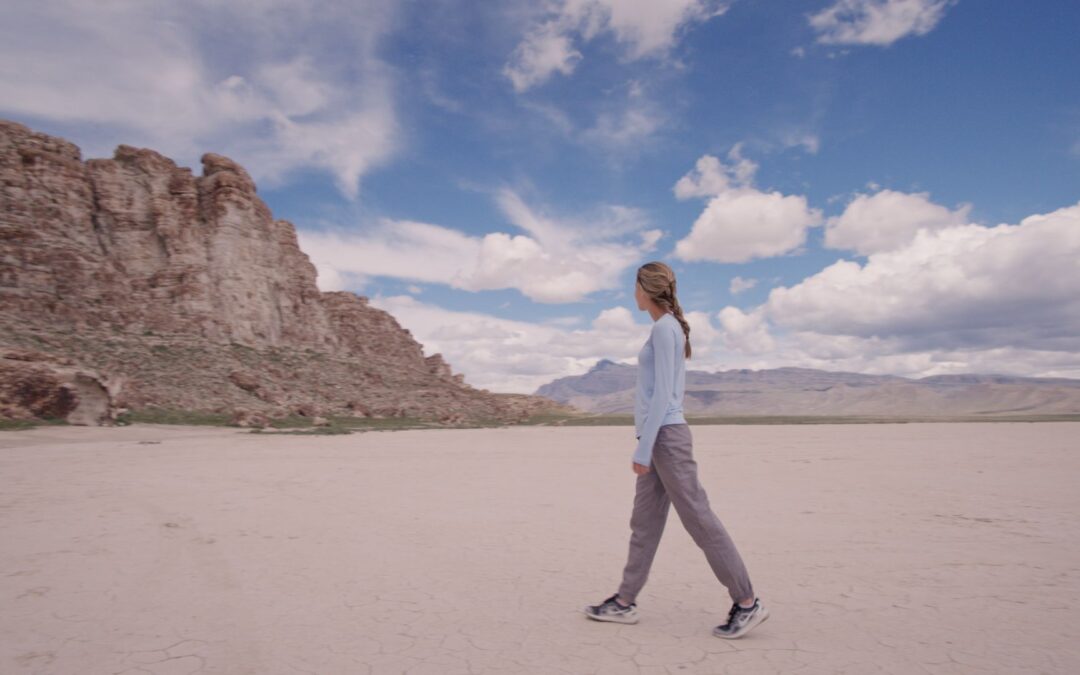(IMAGE: Topiary Productions)
Indie Rights, 2022. Drama. 86 minutes.
Grade: 2.5 out of 4
Streaming on Prime Video.
Anyone unfamiliar with geological jargon may feel like they’re watching a foreign-language film without the subtitles at the beginning of Unconformity. Writer-director Jonathan DiMaio based his screenplay on time spent in the Mojave desert with a geology class, and he does not dumb it down. Not that he needs to – one needn’t comprehend every concept under discussion to know that Ph.D student Alex Haynes (Alex Oliver) has a final project proposal that involves travel to Svalbard, in the Greenland Sea. Or that her supposed boyfriend tells her to keep it under wraps, than steals it as his own pitch, and gets the grant for himself.
Instead, inspired by a poster at her indoor climbing gym, Alex decides to head to the high desert in Nevada, where she can climb and study rocks. In the middle of nowhere, every step of her routine becomes a character-building detail, like it did for Dale Dickey’s character in A Love Song. Alex climbs, crushes rocks, rinses, cooks bad bacon, sleeps in a tent, vomits, and craps behind a rock, which is of course right when someone happens to wander by. Nick (Jack Mulhern) is a second-generation rancher who periodically leads his cattle illegally onto federal land to graze when there’s nothing else around, and their well at home is broken.
Alex and Nick become friends, though it’s a bit weird, as she looks fairly young, but at the right age for small age differences to be important, with him looking younger. They stay platonic regardless, but it’s not always entirely clear if more is being implied…or appropriate. Considering Nick lives with his dad, Everett (Jeremy Holm), who’s just a little bit over the line of being tough-but-fair, the youngster feels even more like a berated kid, while Alex is the epitome of independence. When she starts finding fossils, it’s like a fulfillment of destiny, with fate finally approving her choice to come out to the desert.
For the most part, DiMaio observes. The rhythms of life as a field geologist, or as a desert rancher, feature specifics the viewer may not understand upfront, but they deliver a sense that the filmmaker, at least, knows what he’s talking about. Seeing the ins and outs of these lives is rewarding, yes, but figuring out every detail is less important than watching how these folks deal with the particular adversities that come up, from broken fences to the overly attentive BLM Agent Lowrie (Eddie Martinez), whose routine checkups come to feel more and more threatening.
Note: just as an example of how little the movie explains, it might be worth pointing out to politically active readers that “BLM” in this case stands for “Bureau of Land Management,” rather than anything more hot-button. It’s one of many items the movie assumes you’ll either figure out, or not. Ultimately, however, the decision not to overexplain conveys two things: that DiMaio knows what he’s talking about, and that he trust you to catch up to the important stuff. This may not be true for every viewer, of course, but plenty should appreciate him for it.
Hana Kitasei’s cinematography takes advantage of the whole frame, emphasizing the vastness of the space, with Alex sometimes looking like a tiny ant against the desert’s plateaus. In interiors, she looms larger, but against almost nothing, with the academic spaces overwhelmingly white-walled and devoid of other interesting objects. Nick’s world is more interesting in that way – his house and local bar like cozy caves in which to briefly retreat from the great wide open.
Alex’s skin and hands, incidentally, seem remarkably unweathered for what she does. Movies gonna movie, of course, and Unconformity eventually feels the need, as many stories do, to contrive a crisis that brings closure to everyone’s storyline. After most of what we’ve seen is such unhurried observation, it’s like a sudden reminder that this isn’t real, but a scripted melodrama that’ll do what they all do. If it’s done its job, you’ll care about the characters enough that the forced feeling of the finale won’t be a dealbreaker. But it’s ironically a pretty conformist way to wrap it up.

